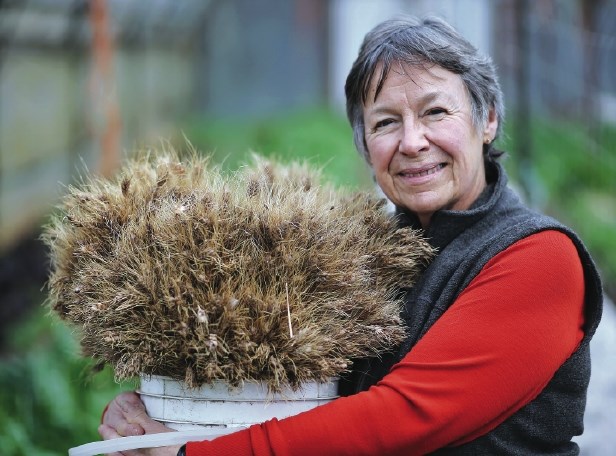Print a label. Stick it on a brown envelope. Pop seeds inside. Seal.
Repeat 10,000 times.
It’s an annual ritual for Mary Alice Johnson, the 71-year-old owner of ALM Organic Farm and Full Circle Seeds in Sooke. The retired teacher packages 280 varieties of organic vegetable, grain, herb and flower seeds for local and mail-order customers across the continent.
Johnson chooses seeds from the most robust plants on her idyllic farm, where she grows vegetables for local restaurants and catering operations and processes seeds for other growers.
For Johnson, the connection to the land dates back to childhood. She grew up on a farm in Colorado and her late husband, metal artist Jan Johnson, was raised on a ranch in Wyoming. They moved from Asia to Sooke, where they bought a rundown 10-acre farm on Otter Point Road and worked hard with neighbours and friends to bring it back into production.
›› READ MORE from Capital magazine
“Sometimes your past catches up with you,” Johnson says. “My mother was a great gardener. For me, it is play. I love digging in the dirt.”
A life-long teacher, Johnson earned a master’s degree in curriculum and instruction at university in Michigan and teaching remains an integral part of her everyday life, as she happily shares her knowledge of farming and seed production.
The farm has seven greenhouses, including three on skids that Johnson can move into optimal positions.
The renowned Sooke Harbour House was among early buyers of her produce. Johnson supplies several restaurants and catering firms, sells at the Moss Street and Sooke Country markets and runs a pickup produce-box program from the farm, as well as the seed business.
About 100 apprentices have worked on the farm through the Stewards of Irreplaceable Lands program, learning about organic farming using sustainable practices.
“It wasn’t that long ago that I could outwork any one of them,” Johnson said with a laugh.
Her latest advance is a vacuum-based seed-cleaning machine acquired with the help of a $2,700 grant from the Bauta Family Initiative on Canadian Seed Security. Johnson expects to use the machine this year to increase her production.
Johnson said the goal of Full Circle Seeds is to ensure more consumers have access to enough safe and nutritious food to live a healthy life. “Food security has taken off everywhere,” Johnson said. “People really want seeds.”
Individual growers — on small farms, in backyards and even on boulevard plots — are increasingly growing their own food. And they are getting help from agricultural organizations and governments. Johnson said co-operation, education and sharing information are hallmarks of this work, as connections are forged between producers and chefs. Farm markets and roadside stalls are increasing and the appeal of community-supported agriculture is soaring. Organic sections are now standard in grocery stores, with even larger chains buying local produce.
Johnson is one of the eight members of the B.C. Eco Seed Co-op, all small-scale commercial seed growers. The co-op, part of the non-profit Vancouver-based FarmFolk CityFolk Society, is in its 21st year. One of its many events is the popular Feast of Fields, which showcases locally produced food.
Members are striving to “collectively bulk up the quality, the quantity and the diversity of the seed that’s offered in B.C.,” said Heather Pritchard, farm program manager for the society.
Despite enthusiasm for locally produced seeds, data have not been collected on how much is collected and sold, so a study is underway to gather that information, Pritchard said. “But we do know that B.C. imports far more seeds and food than it produces,” Pritchard says.
The goal is to set up a co-op table at special events around the province, so members can sell and distribute seeds to other regions in B.C.
Plans would also see co-op members grow bulk seed and have other members test them to provide feedback and for quality assurance, Pritchard says.
More than 40 Seedy Saturdays and Sundays are held in B.C. each year. About 2,000 turned out for the annual Seedy Saturday in February at the Victoria Conference Centre, says organizer Pat McGuire, who notes “there are a lot of young people who want to get into farming.”
